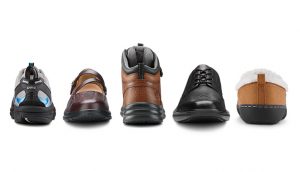Therapeutic Footwear: What kind of diabetic shoes should I buy?
If you have diabetes and develop any foot problems, your doctor might recommend diabetic (therapeutic) shoes. It is important to wear shoes that are suitable for you because inappropriate footwear increases the risk of infections and may lead to foot sores (ulcers) and amputation. Serious foot problems such as nerve damage or loss of feeling in the feet (neuropathy), poor circulation, bunions and other foot deformities also can develop.
A good diabetic shoe will fit well and be able to accommodate changes in your feet. The wrong size shoe, such as one that is too big, can cause blisters, sores, and calluses. Consider these tips on what to look for when shopping for diabetic footwear:
- Look for comfortable and lightweight shoes.
- Material should be canvas, leather, suede or other flexible fabric.
- The shoes should have a shock-absorbing sole and a solid back.
Shoe Types and What to Avoid
The three main types of diabetic shoes are custom-made, in-depth, and healing. Custom-made shoes may be an option if you have a foot deformity. Each shoe is designed from a mold of your foot. This type of shoe is specifically designed to keep your feet healthy, especially if you have an existing foot injury or nerve damage.
In-depth shoes have 1/4 to 1/2 more depth than normal shoes and can accommodate foot changes like calluses or hammertoes. In-depth shoes also have enough room for inserts if needed. Healing shoes are worn while recovering from foot surgery, foot sores or wounds. They are available in open or closed-toe styles. Open-toed shoes are not recommended unless they are ordered by a doctor.
Here are certain types of shoes you should avoid wearing:
- Pointed toe shoes can reduce blood flow to your toes and restrict circulation.
- Shoes without proper arch support may cause breakdown of tissue in your foot.
- Wrong size shoes can lead to foot injury and sores.
- High heel shoes should be worn in a wide-toe style with heels under two inches.
Purchasing Diabetic Shoes
Purchasing the right kind of diabetic shoes begins with a visit to your health care provider who can check your feet and recommend or prescribe the right shoes. You also may see a specialist who can order your shoes for you, or you may get them through Carmichael’s Retail Stores. When trying on new shoes, wear socks or stockings you plan to wear with them. We also have a certified staff member to assist with the selection of proper shoes.
Carmichael’s accepts various payment options that include Medicare, Medicaid Healthy Louisiana (Bayou Health) and private insurance plans. With a doctor’s prescription, Medicare will cover the cost of one pair of therapeutic shoes and inserts per calendar year. You also can modify shoes you already own. Medicare will cover shoe modifications instead of inserts. Carmichael’s billing specialists also can check and bill your insurance for you.
Carmichael’s Retail Stores offer a great selection of top-quality, diabetic-friendly shoes, including the Dr. Comfort brand. You should wear these shoes regularly to protect your feet. It is also important to wear the right socks that promote healthy circulation, keep your feet dry, and help prevent infection. If you can purchase two pairs of therapeutic shoes, you can alternate between them to extend the lifespan of both pairs of shoes.
Buying new shoes is just one way to care of your feet. You should get your feet measured each time you try on shoes, and for best fit, buy shoes later in the day if your feet tend to swell. Once you purchase your new shoes, continue to check your feet daily for any changes, follow safety measures and get periodic foot exams.





 Accredited/Certified by The Joint Commission
Accredited/Certified by The Joint Commission